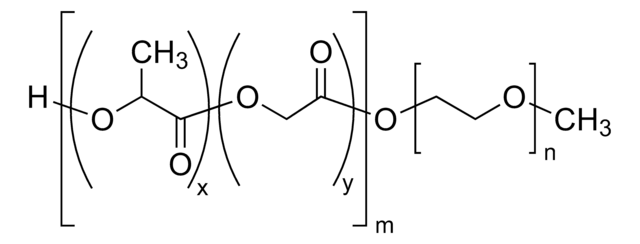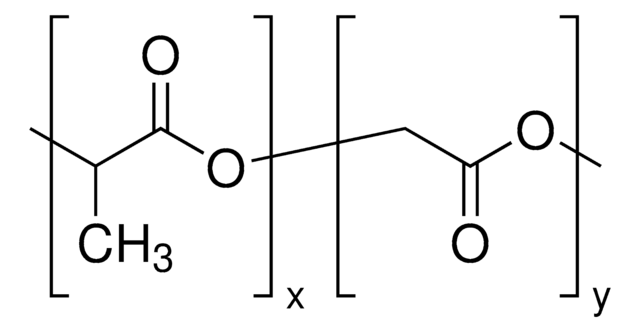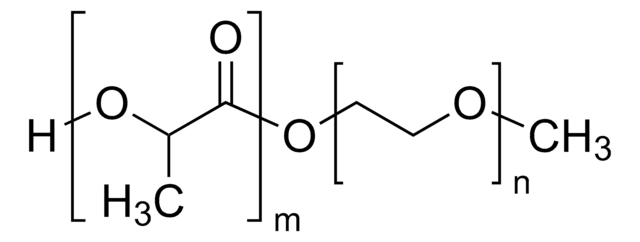764825
Poly(ethylene glycol) methyl ether-block-poly(lactide-co-glycolide)
PEG Mn 2,000, PLGA Mn 4,500
Sinônimo(s):
PEG-PLGA, Polyethylene glycol, mPEG-b-PLGA
About This Item
Produtos recomendados
Formulário
pellets
Nível de qualidade
proporção de alimentação
lactide:glycolide 65:35
peso molecular
PEG Mn 2,000
PLGA Mn 4,500
average Mn 6,500 (total)
prazo de degradação
1-4 weeks
temperatura de transição
Tm 241-246 °C
PDI
≤2.0
temperatura de armazenamento
2-8°C
Procurando produtos similares? Visita Guia de comparação de produtos
Descrição geral
Aplicação
Características e benefícios
- Good biocompatibility, low immunogenicity and good degradability.
- Properties can be easily modulated by changing the block copolymer segment sizes to suit a particular application.
Código de classe de armazenamento
11 - Combustible Solids
Classe de risco de água (WGK)
WGK 3
Ponto de fulgor (°F)
Not applicable
Ponto de fulgor (°C)
Not applicable
Escolha uma das versões mais recentes:
Já possui este produto?
Encontre a documentação dos produtos que você adquiriu recentemente na biblioteca de documentos.
Os clientes também visualizaram
Artigos
One of the common difficulties with intravenous drug delivery is low solubility of the drug. The requirement for large quantities of saline to dissolve such materials limits their clinical use, and one solution for this problem that has recently generated interest is the formation of drug-loaded micelles.
Local delivery of bioactive molecules using an implantable device can decrease the amount of drug dose required as well as non-target site toxicities compared to oral or systemic drug administration.
Professor Nicola Tirelli (Istituto Italiano di Tecnologia, Italy) highlights the microfluidic-assisted method for fabricating well-defined and reproducible nanoparticles for drug delivery research.
Aliphatic polyesters such as polylactide, poly(lactide-co-glycolide) and polycaprolactone, as well as their copolymers, represent a diverse family of synthetic biodegradable polymers that have been widely explored for medical uses and are commercially available.
Nossa equipe de cientistas tem experiência em todas as áreas de pesquisa, incluindo Life Sciences, ciência de materiais, síntese química, cromatografia, química analítica e muitas outras.
Entre em contato com a assistência técnica





